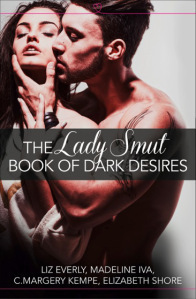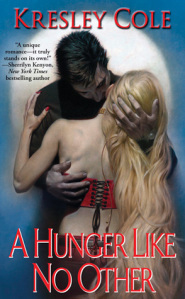Old Skool vs New: Consent in the Supernatural
by Kiersten Hallie Krum
Consent in romance can be a bit tricky to unpack given the less than vaunted history of rape fantasies and forced seduction in the genre. One of the most common slurs against the romance genre is that they are nothing more than “bodice rippers,” novels where the pristine heroine is “forced” to succumb to her older, more-experience lover as he reveals her untapped passion. I put forced deliberately in quotes because in such old skool romances, as we refer to them now, the heroine had to be portrayed first as a sexual innocent and then as only reluctantly “forced” into enjoying her sexuality through the hero’s overwhelming desire. She could only give into sex and enjoy it if the man gave her no other choice whether by overwhelming her with his desire or by actually overwhelming her. Kathleen E. Woodiwiss’ seminal The Flame and the Flower is the gold standard of this trope where the heroine is mistaken by the hero for being a prostitute and is “forced” into sex, almost blatantly raped under the guise of romance. Later, after he’s forced to marry her because she was innocent and genteel-born and he “ruined” her, she essentially falls in love with her rapist. Wonderful role-models for romance there.
Thankfully, romance has come a long way from those rape fantasy tropes. These days, if there’s force going on in a romance, it probably involves bindings…and is consensual. But that doesn’t mean the issue of consent has gone away and in fact it shows up most overtly in paranormal and urban fantasy romance novels. The question of consent hovers over stories with “fated” lovers, the trope in which the conflicted supernatural creature– whether vampire, wolf shifter, or honey badger–needs his (it’s almost always the male who is in need) fated mate in order to offset some horrible curse. The heroine often sacrifices her ability to consent in these situations: when the world is in peril from a curse, who is she to quibble over losing control of her “destiny”?
The first installment of the crackalicious Black Dagger Brotherhood series involves this trope along with some class A stalking issues for “her protection” as does the original first installment of Kresley Cole’s (admittedly addictively awesome) Immortals After Dark series. As readers, we go with the flow of the story here, that this obsession of the hero for the heroine, one that forces her (no quotes here) to go along with what he wants for an immediate payment of equally supernatural orgasms, is “romantic” in its way since it evolves into a committed love relationship and often is part of the heroine’s own journey to her power, which either matches or eclipses the hero’s. Sure, it’s romantic to think of a lover compelled by forces beyond reason to love and need only one woman, the whole concept of “soul mate” in these cases taken to a supernatural conclusion. But is that really any different from an old-skool forced seduction that ends in a loving marriage? (Full disclosure: I’m actually a big fan of the “fated soul mates” trope, at least in fiction, but that makes me want to all the more deeply deconstruct them.)
Fellow Lady Smut blogger, Madeline Iva, and I touched upon this idea during last week’s Facebook release party for The Lady Smut Big Book of Dark Desires. In her novella in that anthology, Sexomnia, the heroine, Jenny, is possessed by a succubus demon who calls herself Jennifer. When Jenny sleeps, Jennifer comes out to play with a variety of partners with no gender barrier and no thought to Jenny’s own desires. Each night of excess leaves Jenny somewhere new in the morning with no memory of anything–or anyone–Jennifer did while she slept. In this, Jennifer is malevolent, evil, not because of her unapologetic sexuality, but because she’s removing Jenny’s power of consent.
This week’s episode of the deliciously creepy Sleepy Hollow, while admittedly not a romance, featured a succubus as the monster-of-the-week. Here there’s no question she’s entirely evil, sucking life and hearts from her victims in order to sustain a demon overlord. It’s safe to assume nobody consents to getting their heart sucked out.
On the urban fantasy show Lost Girl, Bo is a succubus fighting to understand and control her growing powers. She feeds off the sexual chi of her lovers (or are they victims?) who die when she takes too much of their life force. One of the (sadly) unique draws of the show is the stated lack of slut shaming toward Bo for her biological need to have sex to sustain her life force. But the issue of sexual consent for her partners is never outright addressed. (It’s safe to assume a lack of consent to her draining them of life.) When she trolls her neighborhood bar for potential partners, there’s never a question of whether or not, free of her succubus influence, those partners would choose to have sex with Bo. She’s hot and seductive so it’s assumed that anyone she chooses, male or female, will naturally be ready and willing to get it on.
But what if they’re not? Under the influence of her supernatural power, how would they know? Part of Bo’s power is the ability to control people outside of sex too through her influence on their libido and then make them forget what they did for and with her. How again is that different from a roofie in someone’s drink eliminating their ability to say no? And what about the dichotomy between what the body wants and what the mind knows better than to do? In the Lost Girl mythology, a succubus can arouse a man or woman’s body whether or not his or her mind objects. Any fidelity toward a significant other, for example, would have no significance regardless of the person’s otherwise clear-headed, uninfluenced wishes. Also, the succubus is traditionally female, likely in order to further invest female sexuality as something evil, but switch the genders and the issues of consent in this supernatural trope are even more obvious and possibly even more alarming.

Click on image to buy!
Yeah, romances can just be an escape and urban fantasy/genre shows can just be fantastical camp. But does that erase the responsibility to at least be aware of how we’re playing with and perhaps influencing the consent issue in a pop-culture obsessed society? As we manipulate genre tropes and celebrate female sexuality in its many varied and wonderful embodiments, should we be more careful of addressing consent? Or doesn’t it matter when we’re writing or watching succubuses and vampires and that ever elusive honey badger in the first place?
Want a taste of a demonic succubus? Check out Sexomnia and the other sexy stories in The Lady Smut Book of Dark Desires, now available.
Follow Lady Smut. We’ll ask for your consent every time…and a safe word when needed.







